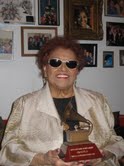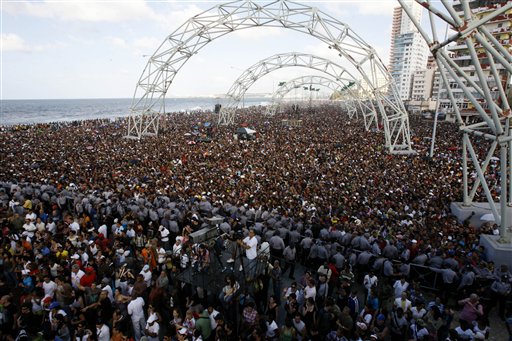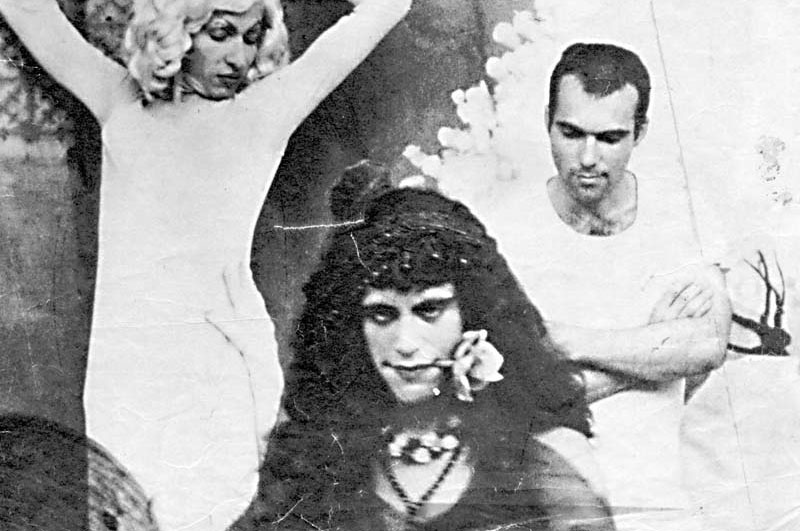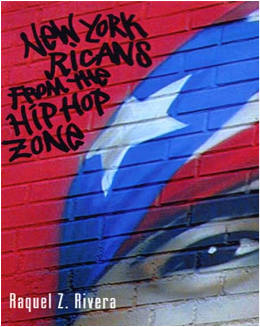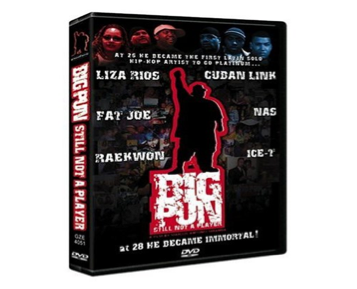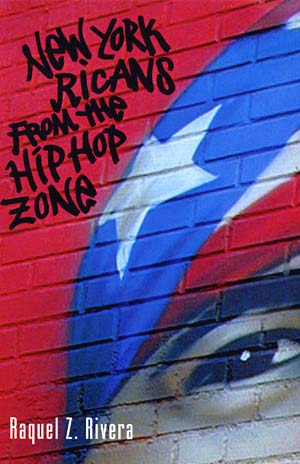Anthropolitical linguist Ana Celia Zentella is a strong proponent of language diversity and respect for language rights.
By Carol Brévart-Demm
Swarthmore College Bulletin (April 2010)
Who of us would ever have imagined that the letter s could be of any significance in issues of social status? For Ana Celia Zentella, the Eugene M. Lang Visiting Professor for Issues of Social Change, phenomena like the “s-ness” in pronunciation of Spanish language varieties offer important linguistic pointers on how speakers of those languages perceive themselves and others whose pronunciation differs from their own.
Zentella cites the example of Dominicans-especially among the working class-who, because they drop the final syllable s from their speech, suffer criticism from those who espouse more conservative pronunciation.
“There are linguistic details that are of great importance in determining class and regional background,” she says. For example, las costas (the coast) in prestigious Castilian Spanish, becomes la cota in Dominican Spanish, and because many Dominicans are poor and dark, this becomes a stigmatizing feature. (listen: Zentella’s faculty lecture)
“S-ness, in and of itself, has no status; it’s endowed with status because of attitudes about the class and racial background of speakers,” says Zentella, adding that the reason for Dominicans dropping the final syllable s can be traced back to Spanish spoken by the southern Spaniards who colonized the Caribbean. Yet linguistic features such as s-ness, Zentella says, are related to ideologies of power and who has a right to be recognized and respected.
A professor emerita in the Department of Ethnic Studies at the University of California at San Diego, Zentella identifies herself as an anthropolitical linguist.
“I thought that by calling my field anthropolitical linguistics, the word ‘political’ would bring to the forefront the importance of social structures and political ideologies,” she says. “And it’s not just an interesting theoretical construct. I see the terrible fallout in schools and communities, in the increase in violence against Latinos in the last few years-a 40 percent increase since 2003.”
Many of these attacks involve people either mimicking Spanish or yelling something insulting about the Spanish language without regard for or understanding of the particular Hispanic ethnicity they’re attacking, she says, citing the November 2008 stabbing of Ecuadorean Marcelo Lucero, 37, in Long Island, N.Y., by seven teenagers because “he looked Mexican.”
Zentella is the daughter of a Mexican father and Puerto Rican mother who grew up in the South Bronx, N.Y. She decries the process of homogenization that has taken place in the United States with respect to what is generally referred to as “the Hispanic community”-more than 45 million people with roots in more than a dozen different countries, all with their own cultures, political systems, and varieties of Spanish. The repercussions of this homogenization include threats to the survival of the various groups’ distinctive linguistic traits and have created a sense of insecurity, especially among young people.
“This issue can divide families, with some members believing in the importance of holding on to their community’s way of speaking, while others believe they should learn and speak only the standard varieties of whichever language is their heritage. Still others believe we should forget altogether about those inherited languages and just adopt English,” Zentella says. “I see the repercussions in terms of increased linguistic intolerance and academic failure of students who are told they have to forget their home languages and focus on English only.”
Zentella believes that espousing “English-only” laws and anti-bilingual education ostensibly for the benefit of immigrant groups is misguided and counterproductive if the goal is to encourage fluency in English while contributing to the cohesion of immigrant families and to linguistic diversity and tolerance in the United States.
In fall 2009, Zentella taught the course Language, Race, and Ethnic Identities, during which she asked the large turnout of 39 students to write term papers on topics of their choice about the languages spoken in Philadelphia. She’ll seek funding to edit the students’ papers and publish them as a book titled Multilingual Philadelphia: Portraits of Language and Social Change. The publication will resemble one produced while teaching at San Diego, called Multilingual San Diego: Portraits of Language Loss and Revitalization.
In her spring semester course, Latino Languages and Dialects in Contact in Families, Schools, and Communities, Zentella’s students are investigating, among other things, the phenomenon of Spanglish-the alternation of Spanish and English, which includes the adoption of some English words that are usually either shorter than the Spanish expression or reflective of a different cultural reality. Her own position is that Spanglish deserves respect as a systematic way of speaking bilingually.
Referring to different points of view among linguists, she explains: “We’re agreed about the vitality of this way of speaking and its linguistic correctness, the rule-governed nature of it, its social importance, and its communicative strength. And we know that in all these different groups of young bilinguals, where there is close and intense contact between groups, they will begin to alternate languages. They do it because they have to alternate between their parents on the one hand and their younger brothers and sisters on the other. So it actually begins at home, and extends to other members of the larger community,” Zentella says. She explains that the alternation becomes a hallmark of bilingualism that indicates belonging in and sharing two worlds, between which and within which those who share this talent can move and communicate with ease.
She further points out that Latinos did not invent the practice of alternating between languages. She cites the existence of Greenglish (Greek/English), Konglish (Korean/English), and Japlish (Japanese/English).
The debate about Spanglish, Zentella continues, is not about the language’s structure or strength but rather about whether as a label it is damaging to its speakers. Zentella’s opponents consider the use of the term Spanglish derogatory, indicative of a mish-mash, sending the message that its speakers are illiterate, alingual, or semilingual, lacking fluency in either language.
Having grown up speaking Spanglish herself, Zentella acknowledges these assertions but approves of the label because it is undergoing a process of what she calls a “semantic inversion, like what black people in the United States did with the label ‘black’ or what homosexuals did with the word ‘queer.'” Many are investing Spanglish with a pride and a strength that recognizes its origins in ways that the suggested alternative terms such as U.S. Spanish or Spanish of the United States do not, she says.
Although the label “U.S. Spanish” might acknowledge the language from a linguistic point of view as being on an equal footing with the other forms of Spanish such as Mexican or Argentinian Spanish, it fails to highlight the fact as the label “Spanglish” does from the standpoint of anthropolitical linguistics that this language was created within two communities that have been in close (yet by no means equal) contact with each other.
“The children who are trying to identify with both groups by creating this wonderful mesh of two languages are doing things that are not happening in Mexico or in Argentina,” Zentella says.
In her advocacy for equality of language, Zentella has been engaged for the past five years in discussions with the U.S. Census Bureau about its discriminatory method of classifying the language abilities of immigrants. Questions on the census form inquiring about languages other than English spoken in homes categorize English proficiency levels spoken by non-native English speakers by offering four options-“not at all,” “not well,” “well,” or “very well”-on the form.
In evaluating the responses, Zentella says, the Census Bureau groups all responses other than “very well” into one class called “linguistically isolated”-a categorization she abhors and is striving hard to have changed. She says that even children who speak only English at home, if living with nobody over the age of 14 who speaks “very well,” are classified as “linguistically isolated.
“This distorts the real picture. Many people say they speak only ‘well’ because they believe that ‘very well’ is how they speak their native language. They don’t put English on the same level as that,” Zentella says.
With the backing of five national organizations, she is suggesting that the Census Bureau substitute two categories-“proficient speakers of English” and “beginning speakers of English”-for the current four and that the label “linguistically isolated” be eliminated.
“This effort is an example of some of the research and observations of anthropolitical linguistics actually being put into practice. These are the ways we try to help people understand that linguistic issues have serious consequences. Even though I’m looking at little things like who deletes the s and where, I’m much more interested in the attitude toward people who delete it and why they don’t see that French has gone through the process and is a highly respected language, while Dominicans have been turned into pariahs.”
In January, the Department of Ethnic Studies at the University of California at San Diego nominated Zentella for the 2010 Alice and Clifford Spendlove Prize in Social Justice, Diplomacy, and Tolerance for her four decades of activism on behalf of racial equality and linguistic diversity.
